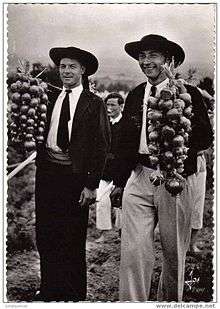Onion Johnny

Onion Johnnies are Breton farmers and agricultural labourers on bicycles who sell distinctive pink onions door to door in Great Britain.
They have adapted this nickname for themselves in Breton as ar Johniged or ar Johnniged.
Declining since the 1950s to only a few, the Onion Johnny was once very common. With renewed interest since the late 1990s by farmers and the public in small-scale agriculture, their numbers have recently made a small recovery. Dressed in striped shirt and beret, riding a bicycle hung with onions, the Onion Johnny became the stereotypical image of the Frenchman[1] and may have been the only contact that the ordinary British had with France.
History
.jpg)
From the area around Roscoff in Brittany known as Bro Rosko, Johnnies found a more profitable market in Britain than at home, and typically brought their harvest across the English Channel in July to store in rented barns, returning home in December or January. They could have sold their produce in Paris, but the roads and the railways were bad in the 19th century and going there was a long and difficult trip; crossing the channel was shorter and easier. The trade apparently began in 1828 when the first successful trip was made by Henri Ollivier. Journeys are now made by ferry but small sailing ships and steamers were used previously, and the crossing could be hazardous. Seventy Johnnies died when the steamer SS Hilda sank at Saint-Malo in 1905.[2]
The golden age was during the 1920s; in 1929 nearly 1,400 Johnnies imported over 9,000 tonnes of onions to the UK. The Great Depression, followed by the devaluation of the Pound in the early 1930s, ended the era as trade suddenly fell, reaching a low in 1934, when fewer than 400 people imported under 3,000 tonnes.
In the aftermath of World War II, onions in common with other goods were subject to import restrictions, and were obliged to be traded through a single company. By 1973 the number of Johnnies had dropped to 160, trading 1,100 tonnes, and had fallen again to around 20 by the end of the 20th century. The legend of their transporting their produce to Britain inspired farmers in Brittany to set up Brittany Ferries in the 1970s.
In culture
The Onion Johnny museum opened in Roscoff in 2004, with a two-day Fête de l'Oignon (Onion Festival) held every summer. Since 2009 the Roscoff onion has been protected under the French Appellation d'Origine Contrôlée designation.[3]
References
- ↑ Which is quite a contradiction, because they (at least those born before World War II) could not really speak French well or only with difficulty (Breton being a Celtic language related to Cornish and Welsh), so that in Wales they often used Breton to converse with the Welsh. "Non parlé au pays et a fortiori en Grande-Bretagne, le français était mal maîtrisé. Son usage ne c'est introduit dans les familles qu’après 1930, et cela par l’entremise des enfants scolarisés. Il était alors étrange et émouvant de voir les aînés, les Johnnies, conduits à parler – difficilement – le français quand leurs cousins de Normandie ou de Paris venaient en visite l’été." (Not spoken at home and even less in Great Britain, French was ill known. Its use began to extend in the families after 1930, because the children learnt it at regular schools. It was quite odd and moving to see the elders, the Johnnies, trying to speak French - with difficulty - when their cousins living in Normandy or in Paris visited them in summer) in La saga des « Johnnies » de Roscoff by Marie-Thérèse Chapalain. [www.laligue.org/assets/Uploads/Diaspo8oignonsLigue.pdf]
- ↑ passenger list
- ↑ "Décret n° 2009-1268 du 19 octobre 2009 relatif à l'appellation d'origine contrôlée « Oignon de Roscoff » (Decree No. 2009-1268 of 19 October 2009 relating to the controlled designation of origin 'Roscoff onion')". Legifrance (in French). Retrieved 17 December 2015.
Further reading
- Herrick Corre, Trubuillou eur Johnny war e vloavez kenta in le Courrier du Finistère 1929.
- "Onion Johnnie" article from the International Herald Tribune
- BBC short film (RealVideo)
External links
- The Johnnies of Roscoff and its region (PDF) in French, Breton and English
- La Maison des Johnnies et de l’Oignon de Roscoff, Onion Johnny museum (in French)
- A modern Onion Johnny (archived content)
- A photo documentary of the last bicycle onion man (Dead link, Feb 6th, 2015)
.jpg)